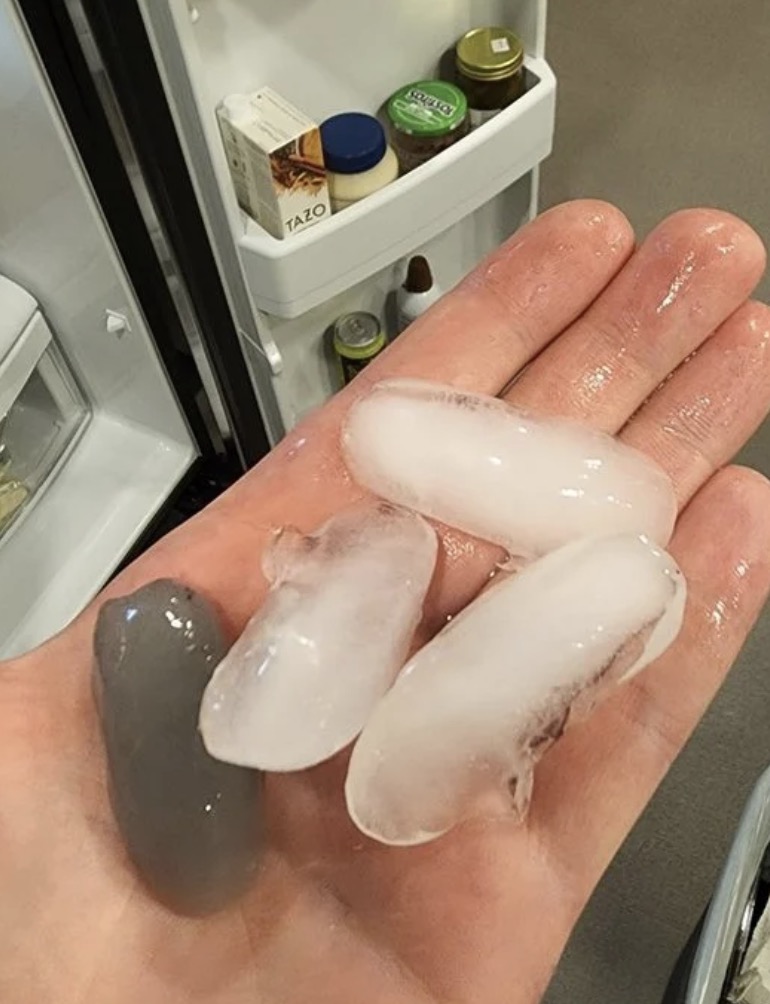
Are the ice cubes coming out of your fridge gray? This is a typical issue that is typically simple to resolve. Find out what causes and fixes gray ice.
If the ice maker is integrated into your refrigerator, you might have noticed that sometimes the ice cubes come out gray. I was taken aback by this when it first happened to me. Did my refrigerator break? Had there been some poisoning of my ice?
Fortunately, neither theory turned out to be true. Nevertheless, you shouldn’t disregard gray ice cubes from your refrigerator’s ice maker. Find out exactly what triggers this unpleasant event and how to handle it appropriately.

What Causes Gray Ice Cubes?
The three most common causes of gray ice cubes from your fridge’s ice maker are dirt in the ice maker, charcoal sediment from a fresh filter or an old filter that needs to be replaced.
Let’s take a look at each scenario.
Dirt in the ice maker
Like all parts of your fridge and freezer, the bins in ice makers accumulate dirt and debris. Over time this unwanted material can bond to ice cubes as they’re dispensed into the tray, giving the cubes a gray, discolored appearance.
Charcoal sediment from fresh filter
Nearly all modern fridges equipped with ice makers and water dispensers have replaceable filters inside to keep the water and ice clean. Most of these filters rely on carbon to get the job done since it’s good at absorbing impurities.
Water enters the fridge through a supply line, where it’s forced through a cylindrical filter packed with a block of compressed carbon before reaching the ice maker and water dispenser.
As you might expect, these filters need to be replaced from time to time. New filters always have some loose carbon particles inside which are fine enough that they exit the filter along with your water. Small black particles of carbon in your fridge’s water can quickly lead to gray ice cubes.
An old filter that needs replacement
Eventually, fridge filters stop doing their job, and begin letting unwanted substances through and into the fridge’s water dispenser and ice maker. This can quickly lead to grayish ice cubes. Most manufacturers recommend fridge filter replacement roughly every six months depending on the water volume used.
How Do I Clean Dirty Ice?
If your fridge has started spitting out gray ice cubes, cleaning your ice bin is the first and easiest thing to try. Unplug the refrigerator, then remove all the ice from the ice bin in the freezer. Take the ice bin out, then thoroughly wash it with soap and water. If lots of dirt comes off, chances are you’ve discovered the reason for your gray ice. Dry the ice bin carefully, then replace it in the fridge and plug the fridge back in. When the ice maker has a chance to make a new batch of ice cubes, check them out. If your ice bin was dirty, the new batch of ice will now be clean and normal in color.
If you suspect your gray ice stems back to a fridge filter issue, that’s where you should look next. Most filter-related grey ice problems happen because a fresh filter has been installed but not flushed. New carbon filters in fridges often give off small amounts of carbon particles for a while, leading to gray ice cubes. Solve the problem by running 2 to 3 gallons of water through your filter via your fridge’s water dispenser. This is known as “flushing” the filter. It should be enough to wash away all the loose carbon particulate in your new filter. If your fridge doesn’t have a water dispenser, dispose of the first couple of batches of ice after filter replacement.



Leave a Reply